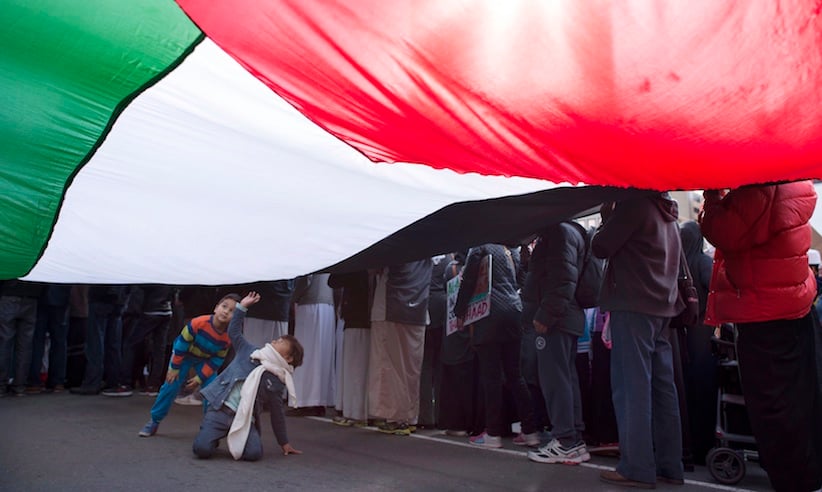Palestine’s most uncommon ally
Equating its apartheid past with Israel, South Africa has emerged as one of Palestine’s most outspoken supporters
Two young boys play beneath a Palestinian flag as thousands of chanting pro-Palestine demonstrators streamed to Parliament in Cape Town, South Africa Wednesday July 16, 2014. The crowd held aloft scores of banners and posters, calling for an end to the violence in Palestine’s Gaza Strip. (AP Photo/Gareth Smit)
Share

Since the Israeli operation in Gaza began almost a month ago, South Africans have been experiencing a haunting sense of déjà vu. As the Palestinian death toll soars, South Africa is calling for radical action against Israel, likening the fight to its own struggle for freedom against whites-only rule. “What we went through, over 300 years of colonial oppression in South Africa, is like a Sunday-school picnic, compared to what Palestinians are going through every day,” said influential trade union boss Zwelinzima Vavi in July at a pro-Palestine rally. “Send a ticket to our ambassador in Tel Aviv and bring him back with his entire family, never to go back to that racist country.”
While some of Palestine’s Arab neighbours, from Egypt to Saudi Arabia, have grown increasingly uncomfortable with Hamas and are offering it little in the way of public support, South Africa has emerged as perhaps its most unwavering ally. Protesters have taken to the streets outside parliament in Cape Town, urging South Africa to sever ties with what they call “apartheid Israel.” On Twitter, hundreds of people have changed their profile photos to the Palestinian flag or images of Nelson Mandela with former Palestinian leader Yasser Arafat.
Mbuyiseni Ndlozi, national spokesman for the third-biggest political party in South Africa, the Economic Freedom Fighters, says the South African government, having benefited from the world’s anti-apartheid sanctions two decades ago, has an obligation to intervene on Palestine’s behalf. “A government that comes out of such a history should not hesitate to take a position,” says Ndlozi.
“The support of the Palestinian people is drawn from our own experience of having to live as a majority dominated by a minority,” says Sanusha Naidu, a political scientist at the University of Pretoria. It does not help that Israel was one of South Africa’s largest trading partners during apartheid, supplying arms to the regime, among other things, when no one else would, says Naidu. “We’re looking at Palestine and saying, ‘We went through this.’ ”
Without the extraordinary spirit of reconciliation championed by Mandela, the South African government would have taken a hardline approach to Israel, says Alon Liel, who served as Israel’s ambassador to South Africa from 1992 until 1994. “Mandela told me, if Israel will enable the Palestinians to achieve their freedom like the blacks in South Africa achieved, then everything will be normalized,” says Liel, speaking from a suburb of Jerusalem. “But the other leaders of South Africa, you know, many of them carry the grievances of the past,” he says. “They didn’t have this approach.”
For politicians like Ndlozi, there is no way to separate Israel from its support of apartheid. “The apartheid government was killing our people with the armaments it got from Israel,” he says. “It’s very simple.”
Yet the South African backlash against Israel is not only about past grievances. Politicians here have a lot to gain by identifying with Palestine, says Martin Rupiya, associate professor of African renaissance studies at the University of South Africa in Pretoria. By casting the Palestinian fight as a struggle for autonomy against colonizers, politicians position themselves as freedom fighters, a narrative that resonates in South Africa, especially with young voters. “The more you assert that struggle, the more you can redefine yourself amongst the youth,” says Rupiya, “the more you can say, ‘We brought you your liberation.’ ”